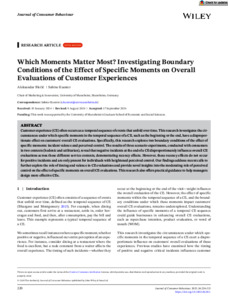|
Which moments matter most? Investigating boundary conditions of the effect of specific moments on overall evaluations of customer experiences
Blečić, Aleksandar
;
Kuester, Sabine
![[img]](https://madoc.bib.uni-mannheim.de/68025/1.hassmallThumbnailVersion/J%20of%20Consumer%20Behaviour%20-%202024%20-%20Ble%C4%8Di%C4%87%20-%20Which%20Moments%20Matter%20Most%20Investigating%20Boundary%20Conditions%20of%20the%20Effect%20of.pdf)  Vorschau |
|
PDF
J of Consumer Behaviour - 2024 - Blečić - Which Moments Matter Most Investigating Boundary Conditions of the Effect of.pdf
- Veröffentlichte Version
Download (1MB)
|
|
DOI:
|
https://doi.org/10.1002/cb.2411
|
|
URL:
|
https://onlinelibrary.wiley.com/doi/10.1002/cb.241...
|
|
URN:
|
urn:nbn:de:bsz:180-madoc-680257
|
|
Dokumenttyp:
|
Zeitschriftenartikel
|
|
Erscheinungsjahr:
|
2025
|
|
Titel einer Zeitschrift oder einer Reihe:
|
Journal of Consumer Behaviour
|
|
Band/Volume:
|
24
|
|
Heft/Issue:
|
1
|
|
Seitenbereich:
|
220-232
|
|
Ort der Veröffentlichung:
|
Chichester
|
|
Verlag:
|
Wiley
|
|
ISSN:
|
1472-0817 , 1479-1838
|
|
Sprache der Veröffentlichung:
|
Englisch
|
|
Einrichtung:
|
Fakultät für Betriebswirtschaftslehre > Marketing & Innovation (Kuester 2005-)
|
|
Bereits vorhandene Lizenz:
|
 Creative Commons Namensnennung 4.0 International (CC BY 4.0) Creative Commons Namensnennung 4.0 International (CC BY 4.0)
|
|
Fachgebiet:
|
330 Wirtschaft
380 Handel, Kommunikation, Verkehr
|
|
Freie Schlagwörter (Englisch):
|
customer experience , overall evalutions , perceived control , recency effects , temporal sequences
|
|
Abstract:
|
Customer experience (CE) often occurs as a temporal sequence of events that unfold over time. This research investigates the circumstances under which specific moments in the temporal sequence of a CE, such as the beginning or the end, have a disproportionate effect on customers' overall CE evaluations. Specifically, this research explores two boundary conditions of the effect of specific moments: incident valence and perceived control. The results of three scenario experiments, conducted with consumers in two contexts (hedonic and utilitarian), reveal that negative incidents at the end of a CE disproportionately influence overall CE evaluations across these different service contexts, demonstrating recency effects. However, these recency effects do not occur for positive incidents and are only present for individuals with heightened perceived control. Our findings address recent calls to further explore the role of timing and valence in CE evaluations and provide novel insights into the moderating role of perceived control on the effect of specific moments on overall CE evaluations. This research also offers practical guidance to help managers design more effective CEs.
|
 | Dieser Eintrag ist Teil der Universitätsbibliographie. |
 | Das Dokument wird vom Publikationsserver der Universitätsbibliothek Mannheim bereitgestellt. |
 Suche Autoren in Suche Autoren in
Sie haben einen Fehler gefunden? Teilen Sie uns Ihren Korrekturwunsch bitte hier mit: E-Mail
Actions (login required)
 |
Eintrag anzeigen |
|
|
 ORCID: 0000-0003-4757-6499 ; Kuester, Sabine
ORCID: 0000-0003-4757-6499 ; Kuester, Sabine  ORCID: 0000-0003-0985-2288
ORCID: 0000-0003-0985-2288



 Creative Commons Namensnennung 4.0 International (CC BY 4.0)
Creative Commons Namensnennung 4.0 International (CC BY 4.0)



 Suche Autoren in
Suche Autoren in